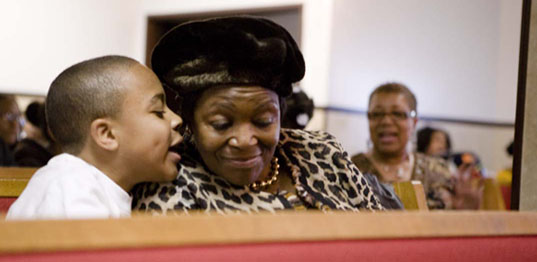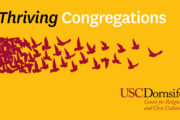Yesterday, Jeremy Rhodes wrote about a new survey from Barna Group that shows that almost 50% of regularly attending American churchgoers say that their lives haven’t changed in any way as a result of their churchgoing habits. In the interest of full disclosure, David Kinnaman, President of Barna, is a former student of mine, and while I am proud of what he has done (and he’s taking Barna in good, new directions), I can’t take any credit for his success. Now back to the issue: church attendance doesn’t do much for half of those who go to church regularly. Without challenging Jeremy’s perspective—which I don’t disagree with at all other than I have absolutely no love for anything Disney—here is perhaps another way to think about the survey and what it might mean for churchgoing Americans.
Now, if I’m a pastor and I read the results of this survey (which I’m not, although I did grow up a pastor’s kid, a fact that probably goes a long way toward explaining why I’m a sociologist interested in religion), I’m thinking that these results suggest that about one-half of my congregation either doesn’t listen to the sermons, or maybe doesn’t understand the key points, or worse, that they find what I have to say completely irrelevant to their lives. Indeed, fully 60% said that they could not recall an important new religious insight from the last time they attended church, and 50% couldn’t remember any insight from the previous week’s service. That has to hurt the pastoral ego.
At the same time (and obviously), about one-half of church attenders do find that their lives have changed in some way as a result of church attendance and involvement. Even better, two-thirds of respondents said that they felt a “real and personal connection” to God while attending church. The pastoral ego is reinflating…barely.
But all of these numbers beg some serious questions. The most obvious perhaps is why would you keep going to church if doing so has no apparent effect in your life? Maybe it’s a place to hang out with your friends, perhaps over coffee in the megachurch cafe. Or, maybe its just habit or you think it’s important to attend, “for the kids.” What is interesting to me is that despite the fact that churchgoers are about split equally in terms of what they learn spiritually, or that church attendance causes some significant change in their lives, a solid majority have had some sort of personal experience of God while in the presence of others—that is, while attending church.
So on the one hand, people say that church attendance hasn’t influenced their lives, and that they can’t recall anything important they learned in church. But on the other hand, they have significant personal religious experiences while attending church. Hmmm… How can we make sense of these findings that seem at least somewhat contradictory.
For me, as a sociologist, I have to think that what all those Sunday School teachers told me when I was growing up—that we shouldn’t be going to church to see our friends—were wrong. It seems to me that friends—and family, acquaintances, even the setting of everybody together doing the same thing—are all significant contributors to one’s religious experiences as well as what a person may remember about being in church. Even the most individual experiences can be thought of in this way. For example, when I go surfing, a deeply personal activity, I can say that on a beautiful winter morning when I’m sitting on my board in the water, looking up at the snow on the mountains 100 miles away, and a small pod of dolphins swims by, that, for me, is a form of spiritual experience. But my understanding of the ocean, mountains, and dolphins in that way isn’t only something “personal” and unrelated to my experiences of and with others. The strong statement would be that I can only interpret these activities as somehow “spiritual” because of all the things I’ve learned in church and school, from family and friends, that have provided me with the categories to interpret those experiences as profound, and maybe even spiritual. That is, even those experiences that we think of as somehow intensely or maybe even exclusively personal, are really only possible because of the social inputs we have already learned and experienced. As for the dolphins, I actually get off of my board and go underwater to listen to them talking to each other as they swim by. Wow.
So, back to the people whose church attendance hasn’t really impacted their lives, but have nonetheless, had personal experiences with God while attending church. Would they have been able to have those same experiences (at least in intensity) if they had never attended church? Maybe that’s the value of attending church (or synagogue, or Friday prayers, etc.), to “hang out” with others who have the same or similar beliefs, and who are also searching for the same sorts of connections. I could be wrong but it seems to me that the power of religion isn’t in the (mythical) individual experience rather, it is in its inherent social nature.
Thus, maybe one way to think about the findings from the Barna survey is that even if people can’t remember a thing about being in church, perhaps the experience of being with other similarly minded people, all with the same intent, is at least one reason why people really keep going to church. At least for half of them.
CRCC Director of Research Richard Flory recently began a three-month stint as a guest blogger at Patheos‘ Black, White and Gray blog. The following piece was published on the blog on January 22, 2012.
Richard Flory is the executive director of the USC Center for Religion and Civic Culture.



